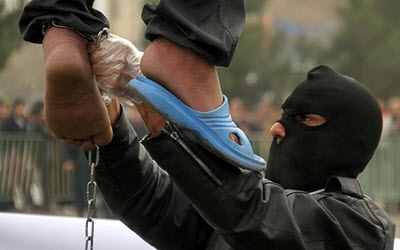Two hanged in Iran prisons
Monday, 25 April 2016/National Council of Resistance of Iran/NCRI
Iran’s fundamentalist regime has hanged two people in prisons in the northern city of Sari and the south-eastern city of Zahedan. On Sunday a 27-year-old prisoner, identified only by the initials H. H., was hanged in prison in Sari, according to the regime’s judiciary in Mazandaran Province. Another prisoner, identified as Javad Sanji, 25, was hanged in Zahedan Central Prison on Saturday. The hangings bring to at least 37 the number of people executed in Iran since April 10. Three of those executed were women. The National Council of Resistance of Iran (NCRI) said in a statement on April 13 that the increasing trend of executions “aimed at intensifying the climate of terror to rein in expanding protests by various strata of the society, especially at a time of visits by high-ranking European officials, demonstrates that the claim of moderation is nothing but an illusion for this medieval regime.” Ms. Federica Mogherini, the High Representative of the European Union for Foreign Affairs and Security Policy, was in Tehran on April 16 along with seven EU commissioners for discussions with the regime’s officials on trade and other areas of cooperation. Her trip was strongly criticized by Mohammad Mohaddessin, chairman of the Foreign Affairs Committee of the NCRI who said: “This trip which takes place in the midst of mass executions, brutal human rights violations and the regime’s unbridled warmongering in the region tramples on the values upon which the EU has been founded and which Ms. Mogherini should be defending and propagating.” Amnesty International in its April 6 annual Death Penalty report covering the 2015 period wrote: “Iran put at least 977 people to death in 2015, compared to at least 743 the year before.” “Iran alone accounted for 82% of all executions recorded” in the Middle East and North Africa, the human rights group said. There have been more than 2,300 executions during Hassan Rouhani’s tenure as President. The United Nations Special Rapporteur on the human rights situation in Iran in March announced that the number of executions in Iran in 2015 was greater than any year in the last 25 years. Rouhani has explicitly endorsed the executions as examples of “God’s commandments” and “laws of the parliament that belong to the people.” The NCRI in a separate statement on Sunday warned that 10 death-row prisoners, transferred to solitary confinement in Ghezel-Hessar Prison in Karaj and Zahedan Prison, are at imminent risk of execution. It called on international human rights organizations to take urgent action to save their lives.
Iran: Call to save 10 prisoners about to be executed
Monday, 25 April 2016/National Council of Resistance of Iran/NCRI
The Iranian Resistance calls on international human rights organizations to take urgent action to save the lives of 10 prisoners transferred to solitary confinement in preparation for their antihuman execution in prisons in Karaj (Ghezel-Hessar) and Zahedan. On April 24, the regime’s henchmen transferred seven prisoners on death row to solitary confinement in Ghezel-Hessar prison in preparation for their execution. Three other prisoners on death row in Zahedan’s central prison were transferred to solitary confinement one more time. Transfer of prisoners to the quarantined ward, special to the prisoners about to be executed, or taking them to the hanging poles to see the execution of other prisoners, are ordinary methods employed to pressure and psychologically torture prisoners in the prisons of the velayat-e faqih regime. On April 18, Mullah Sadeq Larijani, head of the regime’s judiciary, defended the death sentence by saying: “By the laws of the Islamic Republic, we don’t have execution for the sake of killing people; rather, this is Qisas which is a sort of right.” Mullah Rouhani, the so-called moderate President of this regime, has similarly described death sentences as “divine command” and “laws of a parliament that belong to the people.” The wave of executions, especially of young people, demonstrates the regime’s fear of popular discontent and increasing protests by the disgruntled Iranian people and in particular millions of youths who are tired of poverty, corruption, addiction, unemployment and other social problems, which are the product of the mullahs’ rule, and demand the overthrow of the religious fascism ruling Iran.
**Secretariat of the National Council of Resistance of Iran




















